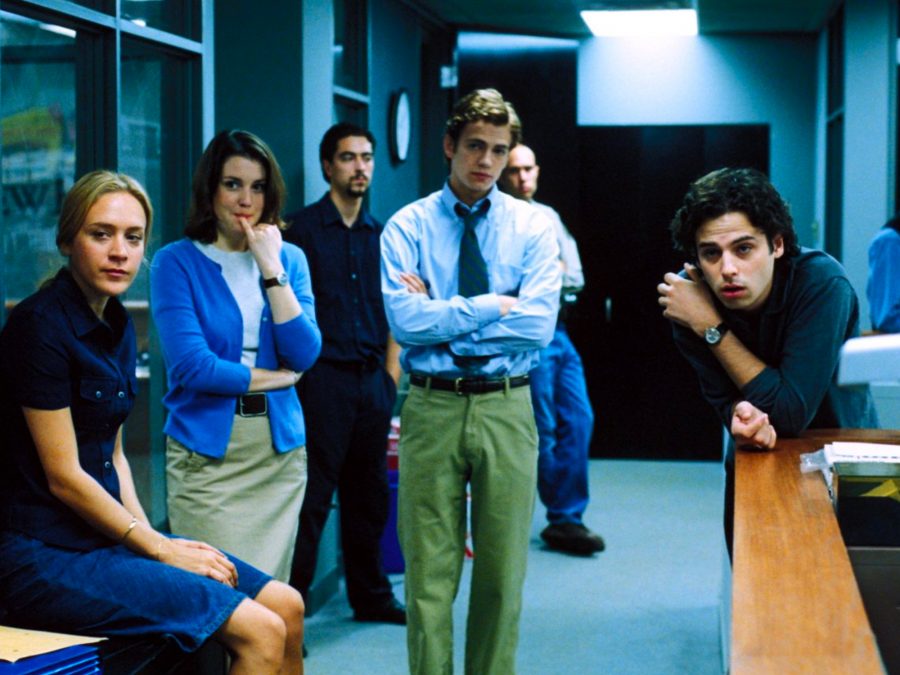Shattered Glass depicts a time ancient enough that, when my colleagues and I watched it, we marvelled at the notion of a magazine writer getting their own office. It even has a little placard on the door, and windows you can look through as someone’s draft gets torn through. Between now and when the New Republic plagiarism scandal movie takes place in 1998, enough things have changed – in journalism, in politics, in cinema – to make its setting feel like another universe. Digital journalism was not yet in a perpetually precarious state, the whole world wasn’t careening to the right, and people went to see movies like Shattered Glass in the theater (well, sort of, the film bombed with $2.9 million).
But what hasn’t changed, besides the way that charming, heterosexual men can be infantilized long enough in the workplace to get away with heinous acts, is the collective impulse to create fictions for ourselves. Only now you can get millions of followers for it.
Based on the article by HG ‘Buzz’ Bissinger, Shattered Glass’ story of sociopathy and the journalistic malpractice perpetrated by the eager-to-please 24-year-old Stephen Glass (Hayden Christensen) is perhaps more interesting in what it doesn’t show rather than what it does. It shows Glass’s questionable reality, dramatizing some of the artificial scenarios he made up for a few of the numerous articles he published while at The New Republic; it shows the unstable office politics and the flimsiness of his charade. But it seems like there’s something else hiding in the film.
Reading Shattered Glass as prophetic for the way that illusions can become identities on the internet feels easy, as evidenced by the lengths Glass goes to cover his tracks by lazily making up a website, phone numbers, and a business card for sources that don’t exist. However, there’s a bizarre queer current that runs through the film. The relationship between Glass’ favored and eventually fired editor Michael Kelly (Hank Azaria) and his replacement Charles Lane (Peter Sarsgaard) feels less like that of colleagues and more like a ping-ponging of Oedipal desire and abjection. Michael Kelly is daddy; Charles Lane is relegated as stepfather.

It feels amplified by the way that, rather than focus on the ways in which Glass is using the resources he is to craft a persona, it fixates on his neediness, his constant need for reassurance, and self-effacement. And while he announces in voice-over that the meekness is mostly a put-on, one is left doubting that confession. “Are you mad at me?” Glass whines to nearly everyone. Christensen’s good looks and tiramisu-toned skin in an already ivory-splashed workplace give him an advantage.
Yet, perhaps this dull, bourgeois version of white masculinity is what feels stifling. While Glass acknowledges the low pay, there’s a degree to which his made-up articles create fantasies of not only successful pieces that make a career, but the kinds of transition he could never fathom making. One article featured in the movie is about a group of barbaric and drunk young Republicans in a hotel suite during a conference, and the other is about a pubescent hacker who brings a large software company with a connection to the government to its knees. But all Glass has is his ambition to become a famous writer, sapping the souls of the people he writes about in lieu of cultivating one for himself.
There’s nothing behind his eyes, maybe even less so than Tom Ripley. Yet Glass’ evil Zelig-like nature has a whiff of gay self-loathing to it: be everything but yourself. That Peter Sarsgaard plays his primary antagonist has a jokiness to it, given that Sarsgaard has aggressive bisexual energy. He’s soft, seductively dry, and his lip curls like he wants to buy you another drink and then ask if it’s okay if you both go to his place and talk about Oscar Wilde. And although Lane is depicted as having a wife and kid, there’s an undeniable homoerotic tension between him and Glass, from their power struggles to their passive aggression in the office.
Early in the film, Glass bemoans to his coworkers that he does things that make him seem gay, like complimenting the secretary’s lipstick. Perhaps all those faked stories were a kind of literary drag, an attempt to become the bold and transgressive human he wished he could embody more meaningfully. Glass could never be a successful child hacker, much less a wealthy young Republican. They feel like, if not perfect matches, then attempts to try on the kinds of humans he’s left observing rather than being. The impulse to try on an identity is familiar to queer people.
That HG Bissinger was drawn to a figure whose identity was predicated on a kind of journalistic self-obliteration, an unmaking of the self through the fabricating of one, makes a certain amount of sense, given that he went public with his experimentation with his gender presentation and sexuality in the documentary Buzz (2019), framed around his Vanity Fair profile of Caitlyn Jenner, donning heeled leather boots, shiny black jackets and studded harnesses. Twenty years after Shattered Glass, and 25 years after Bissinger’s original article, the options for people to investigate themselves through the performance of others are easier than ever. A character on the Internet whose authenticity doesn’t really matter that much is just one in a thousand videos you’ve scrolled past. Is this the self, the world, that Bissinger always wanted? If it’s not, there’s always a new one to try tomorrow.
The post Portrait of the journalist as a young grifter: Shattered Glass at 20 appeared first on Little White Lies.
from Little White Lies https://ift.tt/qC0ulDz
via IFTTT

0 Comments